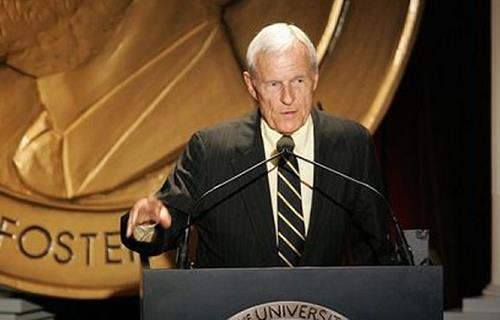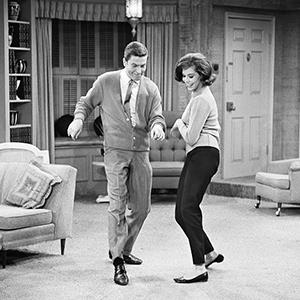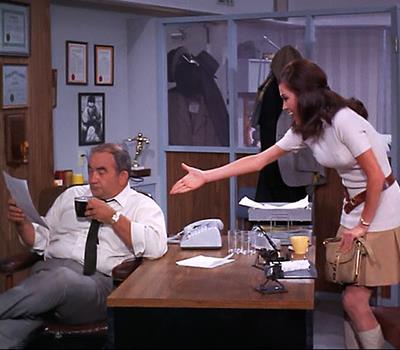
Grant Tinker, the TV executive arguably most responsible for the evolution of quality TV, died Monday at age 90. His legacy lives on, but even though I haven’t spoken to him in years, I really, really miss him already…
 Tinker’s long relationship with quality TV had begun long before I became a TV critic in 1975. As an advertising agency executive in the early 1960s – think Don Draper, only even more handsome, polished, and urbane – Tinker helped shape The Dick Van Dyke Show for Procter & Gamble, and thus for CBS. That’s where he met the show’s young then-unknown actress, Mary Tyler Moore, and eventually married her.
Tinker’s long relationship with quality TV had begun long before I became a TV critic in 1975. As an advertising agency executive in the early 1960s – think Don Draper, only even more handsome, polished, and urbane – Tinker helped shape The Dick Van Dyke Show for Procter & Gamble, and thus for CBS. That’s where he met the show’s young then-unknown actress, Mary Tyler Moore, and eventually married her.
In 1970, he founded MTM Productions, an independent TV production company whose first series was a star vehicle for his wife: CBS’s The Mary Tyler Moore Show, co-created by James L. Brooks. Other hit shows, and phenomenal behind-the-scenes talents, followed, including Bruce Paltrow of The White Shadow and, with Tom Fontana and Tinker’s son Mark, St. Elsewhere; Steven Bochco of Hill Street Blues; and so many more.
MTM Productions was such a positive force, presenting one quality effort after another – think Pixar, if Pixar produced live-action comedies and dramas – that it changed, as well as led, the industry. One of our own TVWW columnists, Tom Brinkmoeller, was so enamored of Tinker’s corporate output that he named his column Raised on MTM.
 To me, even more rare and valuable than Grant Tinker’s taste was his management style. It was as simple as it was unusual: identify the most talented people, then let them do what they most wanted to do, while providing protection from meddling interference from networks. This management style continued even after he ran a network, and took the reins at NBC, where he and his right-hand man, Brandon Tartikoff, supported a string of such brilliant shows as Cheers, Taxi, and St. Elsewhere.
To me, even more rare and valuable than Grant Tinker’s taste was his management style. It was as simple as it was unusual: identify the most talented people, then let them do what they most wanted to do, while providing protection from meddling interference from networks. This management style continued even after he ran a network, and took the reins at NBC, where he and his right-hand man, Brandon Tartikoff, supported a string of such brilliant shows as Cheers, Taxi, and St. Elsewhere.
It was Cheers, in the early 1980s, that brought Tinker, then running NBC, into my immediate orbit. I had interviewed him in large-group press conferences, but never talked to him one-on-one, until I wrote a particularly supportive column about Cheers in Ohio’s Akron Beacon-Journal. The A.C. Nielsen Company, using information from their 1700 “black boxes” attached to TV homes across the country, had just ranked Cheers the lowest-rated show of the week, an unfair turn of events that prompted me to act somewhat rashly.
I wrote a column aimed at any Nielsen family within driving range of my Akron home, and made the following offer: Come to my house on Thursday nights, and I’ll cook you dinner, serve you drinks, and let you watch whatever shows you want on my TV set, all for free. All you have to do, I explained, was tune your own TVs to NBC before you left home, so Cheers and the other Thursday night shows would get rated higher by Nielsen.
The day the column ran, I got two phone calls at the Beacon. One was from the Nielsen folks, threatening to sue (but they didn’t). The other was from Grant Tinker, who loved the idea so much, and the passion behind it, he wanted to talk to me (and he did).
Thus began a long, casual but invaluable friendship. Tinker was the first network executive who would always take my calls, and always gave me great quotes, on or off the record. He provided a dust-jacket blurb for my first book – and, less personally but more sgnificantly, provided hundreds of hours of the best TV shows I’ve ever seen.
I’m proud to say I remain friends with his son Mark, who’s still working in TV – on NBC’s Chicago P.D. – which means I’m lucky enough to have been befriended by two generations of Tinkers.
But I’m very sorry Grant is gone. I can count on one hand the network executives who, in my mind, made a huge and positive impact on network television, and Grant Tinker is chief among them. The others? William S. Paley and Fred Friendly of CBS and Sylvester “Pat” Weaver of NBC before my tenure as a TV critic, and, during my own time covering the beat, Tinker and Tartikoff at NBC, Howard Stringer at CBS, and Brandon Stoddard at ABC.
But no one, at least not in my estimation, was more revered by those who worked for or with him, or left a more clear and influential legacy, than Grant Tinker. He will be missed. He should be remembered.